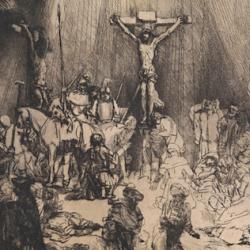Jeremy Treat’s The Crucified King is a salutary attempt to heal the breach in biblical and systematic theology between the kingdom and the cross. The goal of creation is to establish “God’s reign through his servant-kings over creation” (40), and that is what Jesus’ ministry, death, and resurrection aimed at: “Jesus is the servant-king through whom God establishes his reign over all the earth,” and His resign includes “reconciled servant-kings over the new creation” (43).
The surprising lacuna in Treat’s book is ecclesiology. There is a single reference to “church” in the index. Treat certainly talks about “Christians,” and he affirms that God advances His kingdom “through the church – local congregations of God’s reconciled servant-kings” (244). The church is “a sign of the kingdom, a display to this present evil age of the proleptic reality of God’s reign” (244). The church advances the kingdom as members take up the cross to follow Jesus in the power of the Spirit: “The Spirit advances the kingdom by applying the finished work of Christ” (245).
All true, but the book offers too thin a description of how atonement takes communal form.
But the problem is even more fundamental, because if you integrate kingdom and cross and church, then you have to do some revision of traditional atonement theologies, at least those in which Christ’s death (and resurrection) is seen as an isolated founding act that is applied by the Spirit to form the church.
There is much to say here, but one note will suffice for the moment: Paul says in 1 Corinthians 3:11 that Christ is the foundation of the church, but His use of this image elsewhere brings out a different dimension. In Ephesians 2, it is not Christ but Christ-with-apostles-and-prophets who form the foundation with Christ as cornerstone (v. 20), and in Revelation the foundation stones of the heavenly city are inscribed with the names of the twelve apostles (21:14).
It would seem that 1 Corinthians 3:11 should not be read to mean “Christ-in-isolation” is the foundation but “Christ-with-apostles” form the foundation. (It may be significant that in 1 Corinthians Paul speaks of laying the foundation himself [v. 10]; the foundation is Christ, but Christ the foundation is laid by an apostle.)
It seems that we cannot simply say that the formation of the church is the telos of the atonement. It’s not that the church is built on the foundation of Christ; the foundation includes the church. Ecclesiology has to be integrated into any fully biblical atonement theory.













